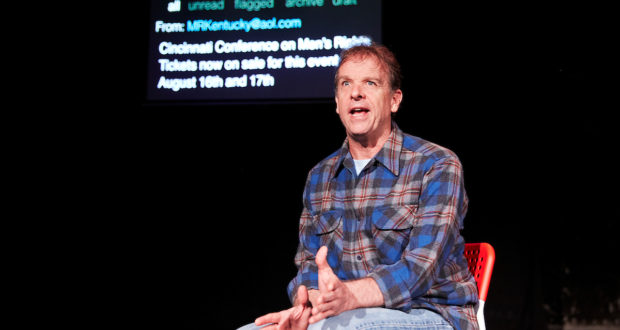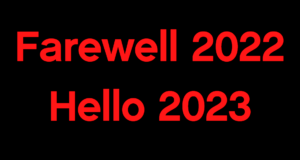After its initial run at the Edinburgh Festival, Penelope Skinner’s monologue on toxic masculinity is making its London debut at Soho Theatre. Angry Alan, which was co-created by and stars American actor Donald Sage Mackay, features Roger, a man who ‘thinks the world’s gone mad’ and finds solidarity in the words of a far-right online activist. Everything Theatre caught up with producer Francesca Moody – currently across the pond re-opening Phoebe Waller-Bridge’s Fleabag – to learn more about how the play captures this unique perspective on a contemporary hot topic.
Hello! What are you up to in New York?
I am one of the producers on Fleabag, which is having its New York premiere. It’s very exciting. It’s nice to experience life in New York and not do all of the tourist-y things; to not feel the pressure to do and see everything!
So exciting! So . . . who is Alan? Why is he angry?
Angry Alan is the leader of a fictitious extremist men’s rights movement. The play is about his role in Roger’s life: he is the voice of reason, to him, amongst the ‘madness’ of liberal contemporary society – that which accepts people who are gay, for example, or don’t define their gender, or of people who use technology in different ways. In a way, Alan is somebody who seems to talk sense. Roger feels like he is being left behind and he is coming from quite an extreme right-wing perspective. Like a lot of extremist political viewpoints, it comes with a lot of anger.
The play is a monologue and is directed by the playwright, Penelope. Has having a small creative team has affected your approach as a producer?
I don’t think my role has changed, but what has been different about this process is that normally I wouldn’t have an actor so involved. When you are making a show on this scale – especially when you are starting somewhere relatively small, like Edinburgh – the role of the producer is always going to be quite hands-on, and the process will be more collaborative. What is so good about working with Penny and Donald together is that there’s very much a ‘three-heads-is-better-than-one’ type of situation. Ultimately, the decisions fall to me as a producer, but there’s a really strong feeling of collaboration. Usually this would happen with just one other person, but to have this sort of tripod has been lovely.
The play is quite of its time – it feels part of a current wave of plays that are dealing with topics like ‘toxic masculinity’ and feminism.
What is so great about the play is that it tells the tale of something that hasn’t been explored that much yet in theatre, especially from a more mainstream playwright like Penelope Skinner, who has had quite a few significant successes in the UK. I am intrigued and excited to see what audiences are drawn to the show in London. Theatre audiences are, generally, quite liberal and therefore quite ‘on-side’ with the message of the play. The show comes from such a unique perspective. The audience can see how the men’s rights movement is a dangerous and toxic – and very real – part of the wider conversation around gender politics, especially with what is going on in America with Trump. The great thing about Penny’s writing is that she writes such truthful, honest characters. We are able to see the experience from the perspective of somebody who is radicalised, and you don’t necessarily have sympathy for that perspective, but you see how it was made possible: how someone could be attracted into that world. Especially somebody who is vulnerable.
I was reading an interview Penelope gave about how she feels her voice is still quite present behind Roger’s. It is a fascinating premise to have such a strong authorial female voice behind this male character.
I think that’s why Donald’s part in the making of this show has been so important. He has had an extremely vital dramaturgical role within the piece in co-creating it with Penelope. What Penny says about her hearing herself within Roger’s voice is true, but also there’s a third-dimension from what Donald has brought to the character of Roger.
What sort of work is getting you excited at the moment, as a producer?
I tend not to pick shows based on a particular theme, but rather work that speaks to me on first reading. I go on my gut reactions a lot of the time. Much of the work that I have produced independently has sat within this canon of gender politics, such as toxic masculinity and feminism. The work that I usually produce is that which I feel has an impact on me, as if it has an impact on me, I think that might give a sense of what the zeitgeist is in terms of what is going on politically.
What is it about Angry Alan that you think will draw an audience to see it?
An audience will see a play that gives an audience a new perspective on something that is incredibly potent and sits right at the centre of what is going on politically at the moment – particularly in America, but generally across the world right now. Every country seems to have their story to tell on gender politics. If an audience wants to see a piece of theatre that sits right in the centre of this, but is also really funny and moving and brilliantly acted, and that you can watch in the space of an hour, then these are all great reasons to see the show. What you’re getting is something that is interesting, funny, and makes you think: you will be talking about it for days after.
All you can hope for when producing work is that people come out of the show and want to talk about it afterwards. Angry Alan would never provoke an apathetic reaction, because it is such a compelling piece of theatre. I think it’s a five-star show.
Angry Alan is currently playing at Soho Theatre through 30 March.
 Everything Theatre Reviews, interviews and news for theatre lovers, London and beyond
Everything Theatre Reviews, interviews and news for theatre lovers, London and beyond



